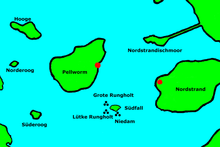Rungholt

Rungholt was a wealthy city in Nordfriesland, in the Danish duchy of Schleswig. It sank beneath the waves when a storm tide (the second "Grote Mandrenke") in the North Sea tore through the area on January 16, 1362.
Rungholt was situated on the island of Strand, which was rent asunder by another storm tide in 1634, and of which the islets of Pellworm, Nordstrand and Nordstrandischmoor are the only remaining fragments.
Relics of the city were being found in the Wadden Sea until the late 20th century, but shifting sediments have carried the last of these into the sea. In the 1920s and 1930s, some remains of the city were exposed; they suggested a population of at least 1,500 to 2,000, which is fairly large for that region and time, and it is likely that Rungholt was a major port. Legend has greatly exaggerated its size and wealth, however.
Impressed by the fate of the city, the relics, and not least legend's excessive descriptions, the German poet Detlev von Liliencron wrote a popular poem called "Trutz, Blanke Hans" about this lost city which starts with the words: "Heut bin ich über Rungholt gefahren, die Stadt ging unter vor sechshundert Jahren". ("Today I traveled over Rungholt; the city sank 600 years ago.")
Local myth has it that one can still hear the church bells of Rungholt ringing when sailing through the area on a stormy night.
See also
External links
![]() Media related to Rungholt at Wikimedia Commons
Media related to Rungholt at Wikimedia Commons
Coordinates: 54°28′N 8°43′E / 54.467°N 8.717°E